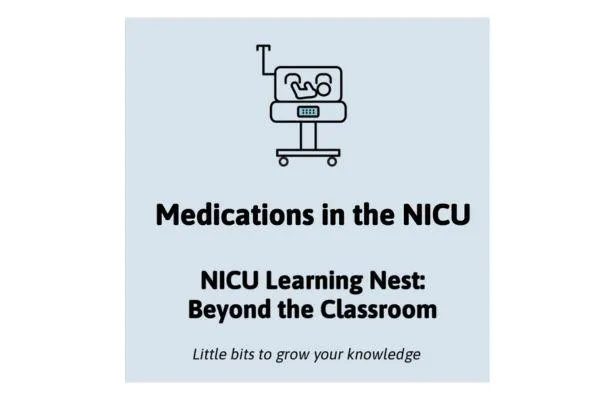
Common Medications in the NICU
Medications Every NICU Nurse Should Know
Medications are part of our everyday NICU practice. They can save a life in seconds, provide stability to a fragile preterm infant, or support long-term outcomes. But with every medication comes responsibility—dosing errors, incorrect timing, or missing subtle side effects can have serious consequences. That’s why NICU nurses need to not just recognize the names of these medications, but understand why we use them, how they work, and what to watch for once they’re on board.
Below are some of the most common (and some less common) medications you’ll see in the NICU—along with a few insights you may not have considered. This list is not all medications and should never replace current trusted resources. Use your EHR and approved resources for dosing guidelines.
Ampicillin & Gentamicin
Our classic antibiotic duo. These are often started in the first hours of life if sepsis is suspected. While you’ll memorize doses quickly, what’s equally important is knowing their differences: Ampicillin covers group B strep and listeria, while Gentamicin helps cover gram-negatives.
💡 Pearl for nurses: Watch renal function with Gentamicin—peak and trough levels aren’t just lab numbers, they tell you if the baby’s kidneys are tolerating the drug.
D10 (10% Dextrose)
One of the simplest, yet most essential medications in the NICU. We use it for glucose maintenance or a quick bolus if a baby is hypoglycemic.
💡 Pearl for nurses: When giving a D10 bolus, always double-check that it’s a true hypoglycemia event—not just a heel stick error. A central or repeat glucose is your friend.
Vitamins and Supplements
Preterm infants often require supplementation with Vitamin D, iron, and sometimes folic acid or multivitamins. These support bone health, red blood cell production, and overall growth. For babies who received prolonged TPN, supplements replace what may have been missed.
🌱 Key takeaway: These aren’t “optional extras.” They are as essential to growth and neurodevelopment as any critical-care medication. Parents often understand them better when compared to prenatal vitamins—supportive, not corrective.
Morphine & Fentanyl
Pain control is essential—even for preemies. These medications are often used for intubation, post-op care, or severe agitation.
💡 Pearl for nurses: Watch closely for respiratory depression. A baby who suddenly seems “too quiet” after a dose needs immediate assessment.
Ibuprofen (for PDA closure)
This little med can do big things—helping close a patent ductus arteriosus and improve cardiac efficiency.
💡 Pearl for nurses: Always check kidney function and platelet count before and during therapy. Parents may ask why ibuprofen is used instead of surgery—explaining it as a “medicine that helps the heart vessel seal shut” is usually effective.
Hydrocortisone
Steroids in the NICU are tricky—they’re used for adrenal insufficiency or to support blood pressure in sick babies. There are a variety of "normal" doses depending on the condition you are treating...be sure to know WHY the medication is ordered to best understand the best dose.
💡 Pearl for nurses: Don’t stop steroids suddenly. Wean per protocol, or you risk adrenal crisis.
Diuretics (e.g., Chlorothiazide)
While Lasix is well known, other diuretics are often chosen to reduce fluid without the same electrolyte swings.
💡 Pearl for nurses: Diuretics can cause metabolic changes over time. Look for subtle signs of electrolyte imbalance—like irritability, poor feeding, or abnormal rhythms on the monitor.
Electrolyte Replacements (NaCl, KCl)
After diuretics, replacements are often needed. These are small doses but carry big risks if given too quickly or too concentrated. These medications are often given orally (PO or NG), therefore we may wait 3-7 days to recheck
💡 Pearl for nurses: Always confirm IV placement and patency before giving KCl. Extravasation can be dangerous.
Dopamine & Dobutamine
These are frontline medications for low blood pressure in the NICU. They support perfusion while the underlying cause is being managed.
💡 Pearl for nurses: Know the difference—dopamine tends to increase blood pressure through peripheral vasoconstriction, while dobutamine helps with contractility. Watch urine output closely; it can be the first sign you’ve found the “sweet spot.”
Acyclovir
Acyclovir is the frontline antiviral when congenital or perinatal HSV infection is suspected. The stakes are high: untreated HSV can cause encephalitis and multiorgan failure. Early initiation, even before confirmation, can save lives.
💬 How to explain to parents: “This medication helps fight off a virus we’re worried could cause brain or organ damage. Starting quickly gives your baby the best protection while we wait for test results.”
IVIG
Used for severe jaundice or immune-mediated issues like hemolysis. It’s not everyday, but when you see it, you’ll remember.
💡 Pearl for nurses: Infuse slowly and monitor carefully—babies can react with fever or changes in blood pressure. Parents may be confused why an “immune treatment” is used for jaundice—explaining that it helps stop the breakdown of red blood cells usually makes sense.
Eye Drops for ROP Exams
A small but mighty part of our practice. Dilating drops allow the ophthalmologist to see the retina during screening.
💡 Pearl for nurses: Parents often notice irritability or trouble feeding afterward—reassure them this is normal and temporary.
Parent Education Matters
Medications can be intimidating for families. Here are simple ways to support them:
Use plain language (“a medicine to help breathing” instead of “caffeine citrate”).
Encourage questions during rounds.
Share printed resources from your NICU or reputable sources like March of Dimes.
Prepare parents for common side effects they might see—like irritability after caffeine or sleepiness after pain meds.
To Recap
NICU nurses don’t just administer medications—we advocate, assess, and educate. Knowing the mechanism of action helps you anticipate side effects, catch errors, and confidently answer parent questions. From everyday meds like antibiotics and D10 to high-stakes infusions like dopamine or IVIG, each medication tells a story about what’s happening inside the baby. Mastering these meds isn’t about memorization—it’s about understanding the why behind each dose.
